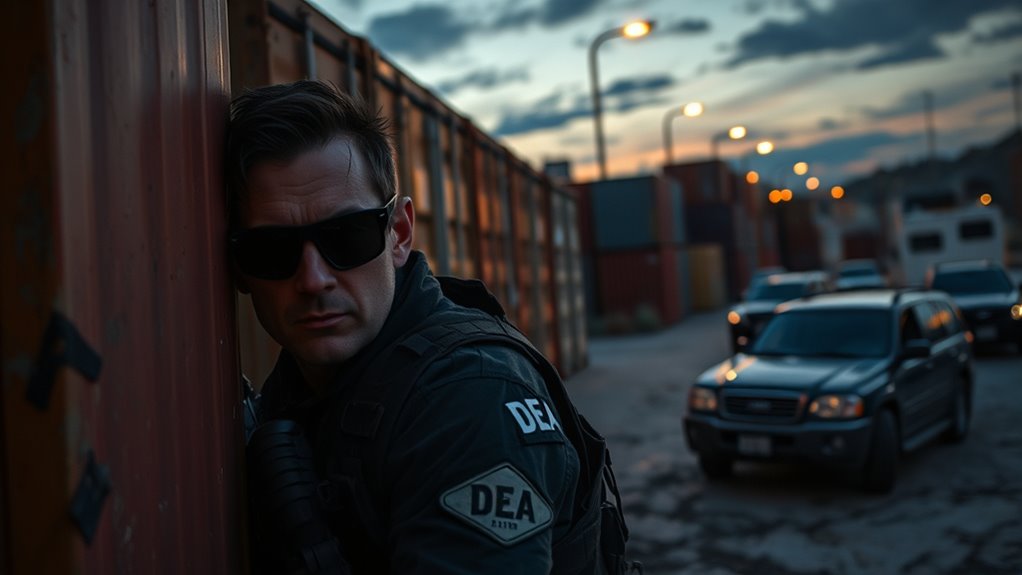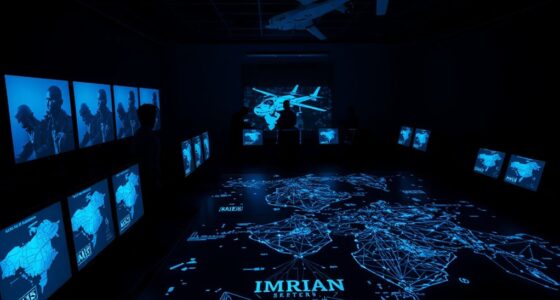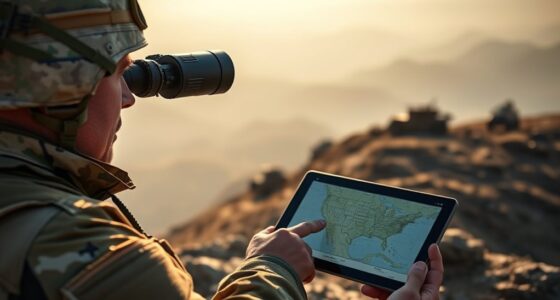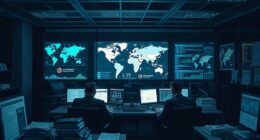The DEA’s hidden mission goes beyond fighting drug crimes, as agents secretly support U.S. intelligence efforts by infiltrating criminal networks and gathering vital information. You might not see how undercover work helps identify terrorist links, disrupt illegal financial routes, or provide intelligence that strengthens national security. These covert operations involve long-term planning and high risks, making them essential to protecting the country. If you want to discover how this all works, keep exploring further.
Key Takeaways
- DEA agents conduct covert operations to infiltrate drug cartels, gathering intelligence beyond drug interdiction efforts.
- Undercover agents build trust within criminal networks, collecting details on organizational structure and illicit activities.
- The DEA shares intelligence with agencies like CIA and NSA to support national security and counter-terrorism.
- Intelligence from DEA operations helps identify key figures, financial routes, and logistical networks used by traffickers.
- These clandestine activities enable the U.S. to disrupt foreign support for criminal and terrorist organizations.

Have you ever wondered if the Drug Enforcement Administration‘s true purpose extends beyond its public mission? While the DEA is primarily known for battling drug trafficking and dismantling narcotics networks, there’s a hidden side to its operations that often goes unnoticed. Behind the scenes, DEA agents play a essential role in supporting U.S. intelligence agencies, gathering critical information that influences national security. This covert aspect of their work involves intricate undercover operations designed not just to seize drugs but to penetrate deeper into criminal organizations that threaten broader interests.
When you think of drug trafficking, you might picture agents raiding warehouses or making arrests. However, a significant part of their mission involves undercover operations—disguising themselves, building trust, and infiltrating the most dangerous networks. These clandestine activities allow agents to gather intelligence on international drug cartels that often have links to terrorist organizations or other foreign adversaries. The intelligence collected is indispensable, providing insights that go far beyond the immediate goal of stopping drug flow. It helps identify key figures, financial transactions, and logistical routes, creating a detailed map of criminal activity that can be used for multiple national security purposes.
By embedding themselves within these organizations, DEA agents become essential assets to U.S. intelligence efforts. Their undercover work often overlaps with efforts from agencies like the CIA or NSA, sharing information that can prevent terrorist attacks or disrupt foreign governments supporting illicit activities. This isn’t just about stopping drugs; it’s about safeguarding the nation from threats that could destabilize security at home and abroad. The line between drug enforcement and intelligence work blurs as agents gather evidence on criminal networks that may have broader geopolitical implications.
These covert operations are high-stakes and risky, demanding the utmost skill and discretion from agents. They often involve long-term planning, maintaining false identities, and navigating dangerous situations where betrayal is a constant threat. While the public rarely hears about these missions, they’re essential to understanding how the DEA functions in a broader context. Their work helps establish a thorough strategy against transnational crime, supporting the U.S. government’s efforts to combat terrorism and protect national interests. Additionally, their efforts in sleep deprivation and mental health can enhance their focus and resilience during these demanding operations.
In essence, the DEA’s hidden mission reveals a dual purpose: not only to combat drug trafficking but also to serve as an intelligence asset in safeguarding the nation. Their undercover operations provide critical intelligence that shapes policy decisions and enhances national security. So next time you hear about a drug bust, remember that beneath the surface, there’s often a deeper, more complex mission unfolding—one that helps keep America safe from threats lurking in the shadows.
Frequently Asked Questions
How Does the DEA Coordinate With Other Intelligence Agencies?
You see, the DEA coordinates with other intelligence agencies through joint task forces, sharing intel on drug trafficking networks. They conduct undercover operations together to infiltrate criminal organizations, gather evidence, and dismantle drug operations. This collaboration guarantees efficient information exchange, enhances surveillance, and strengthens efforts to combat drug-related crimes. By working as a team, these agencies effectively track and disrupt drug trafficking routes, protecting national security and public health.
What Covert Operations Has the DEA Conducted Abroad?
You should know that the DEA conducts covert operations abroad by deploying undercover missions and establishing informant networks. These operations help gather intelligence on drug trafficking organizations, disrupt their activities, and support U.S. national security. By operating discreetly, DEA agents infiltrate criminal networks, collect essential information, and work seamlessly with international partners. This covert work is indispensable for combating drug crimes and protecting U.S. interests worldwide.
Are DEA Agents Involved in Cyber Intelligence Activities?
Yes, DEA agents are involved in cyber intelligence activities. You might find them conducting cyber espionage to gather intel on drug trafficking networks, utilizing digital surveillance tools to monitor suspects’ online activities. Their work helps disrupt criminal operations and supports national security efforts. By engaging in these digital techniques, they extend their traditional roles into cyber spheres, enhancing the U.S. government’s ability to combat drug crimes and related threats worldwide.
How Does the DEA Gather Foreign Intelligence?
You might not realize it, but the DEA gathers foreign intelligence through meticulous investigations into drug trafficking networks. You could be involved in undercover operations that infiltrate these groups abroad, collecting essential information. By working closely with international partners, you help uncover foreign drug routes and activities. Your efforts provide crucial intelligence that supports national security and disrupts global drug trafficking, all while operating covertly to protect sources and missions.
What Legal Authorities Enable the Dea’s Intelligence Missions?
You’re empowered by legal jurisdiction under laws like the Foreign Intelligence Surveillance Act (FISA), which lets the DEA conduct intelligence activities abroad. You also benefit from intelligence collaborations with agencies like the CIA and FBI, enabling data sharing and joint operations. These legal authorities and partnerships help you gather foreign intelligence effectively, supporting national security and interdiction efforts while complying with legal standards.
Conclusion
You now see the DEA’s dual duties—deterring drugs while delivering data. Behind the badge, they blend bravery with secret missions, serving as silent sentinels for national security. Their covert cooperation complicates conflicts, creating a complex, concealed coalition. Remember, their true task isn’t just tackling traffickers but transforming threats into tactics. In this clandestine choreography, courage and concealment collide, reminding you that sometimes, the most meaningful missions remain hidden behind the scenes.









